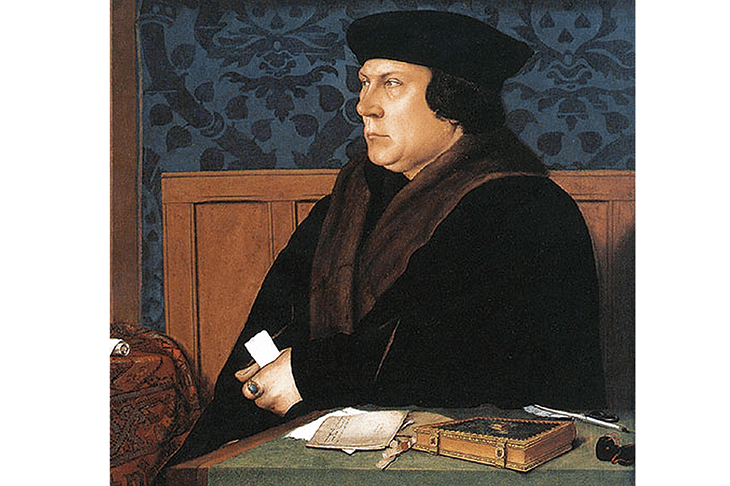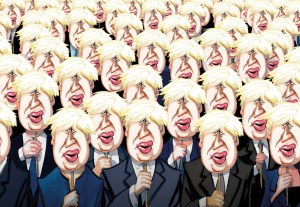When the judges for the 1992 Booker Prize received Hilary Mantel’s A Place of Greater Safety, an 800-page novel set during the French Revolution seemed a quirky diversion from the work of a novelist then most associated with shortish dark comedies of contemporary or recent life, such as Fludd (1989), featuring a weird Catholic priest, and Eight Months on Ghazzah Street (1988), in which an Englishwoman suffers Saudi Arabian culture shock. We did not shortlist the book. History shows that monumental distant-historical fiction would subsequently become the glorious core of Mantel’s work, though, perhaps validating our doubts, featuring English, rather than French, revolutionary struggles.
Wolf Hall
(2009) and Bring up the Bodies (2012) — viewing the marital and political maneuvers of King Henry VIII through the eyes of his strategically protean chief adviser, Thomas Cromwell — made Mantel the first writer to win the Booker Prize twice for successive novels. Completing the trilogy, The Mirror & the Light is burdened with the invisible subtitle of being the writer’s bid to win a Booker triple.
With its final side numbered 883, the volume takes the page count of the trilogy’s hardback first editions to 1,967. Cromwell is involved in events from 1536 to 1540, encompassing the end of his patron’s third and fourth marriages and his pursuit of a fifth wife. Readers would need to have truanted during lessons on the Tudors, or now be blocked by Google, not to know why the story ends when it does. Master Secretary Cromwell becomes a Lord, but discovers that, if someone ever starts wondering what they would do without you, they are usually beginning to wonder how you might be done without.
However, Dame Muriel Spark, a clear influence on Mantel, always argued that knowing the outcome can increase rather than reduce suspense, because readers crave to know how it comes about. To this end, Spark often used the formal device that the Greeks termed prolepsis and Hollywood calls flash-forward. In Mantel, the proleptic effect comes from our chronological advantage, but fiction about the Tudors — the best-selling novels of C.J. Sansom and Philippa Gregory are other examples — is an extreme example of Spark’s point.
Even while we know that for this or that wife divorce or death is coming, the narrative remains propulsive. Mantel makes it even more so through a present-tense voice that puts the emphasis on the tense, through the clipped, quick rhythms of Cromwell’s inner voice:
‘He feels tired. Seven years for the king to get Anne. Three years to reign. Three weeks to bring her to trial. Three heartbeats to finish it. But, still, they are his heartbeats as well as hers.’
Six sentences, 37 words. The events are doubly known to the reader — from history and the middle novel — but the punchy rhythm still raises the pulse, the final phrases jolting us forward to the urgent present concern of the toll on Cromwell’s soul.
The grace and grip of the descriptive prose may distract from Mantel’s exceptional skill with dialogue, an element of fiction at which many otherwise successful novelists falter. Having characters misunderstand each other is a sign of how sharply the writer is hearing the voices, as when Cromwell is asked by the French-speaking ambassador Chapuys: ‘What will happen to Guiett?’, and needs a moment to interpret as: ‘What? Oh, Wyatt. He is in the Tower.’ Apart from the reference to a particular medieval punishment, these speeches, though never anachronistic, could come from conversations in Pinter or le Carré. It is no surprise that the earlier books translated so well to the RSC stage and PBS screen. (Theater and television versions of the third book are already underway.)
Another strength — uniting Mantel’s earlier, shorter, contemporary novels with the later, long, historical ones — is the instinct for comedy. This book includes riffs on the Church’s elaborate strictures on the days on which marital intercourse is permitted (‘More than half the year is accursed, one way and another’), and an explanation of how noblemen received a lesser sentence for sodomizing one of their own servants rather than another man’s employee.
My single caveat on language is that Mantel’s sentences, in which vocabulary and shape mainly feel exactly calculated, hold one small syntactical irritation. Rather than the traditional use of ‘he’ or the protagonist’s name in male-viewpoint fiction, the trilogy has favored what will doubtless become known as the Mantel Referent Sub-Clause: ‘He, Cromwell.’ This is clearly an attempt to show that, as the writer has explained, she is ‘behind him, like a camera’, rather than omnisciently narrating his thoughts. And there is a lovely flourish in this book, when the inner voice smugly promotes itself to ‘He, Lord Cromwell’. However, when, at a meal of veal, ‘He, himself, Cromwell, takes up the carving knife’, we may wonder if the trope isn’t affecting the cut of Mantel’s style.
This, though, is a small moan about a great work, which, though categorized by whatever bookshops and libraries survive in digital Britain as historical fiction, has fascinating relationships with other genres. If students still write theses about ‘the Catholic novel’ (Waugh, Greene, Spark, Lodge), then the Cromwell books merit a chapter as a variety of ‘the post-Catholic novel’. Brought up in the Roman faith, Mantel lapsed, and the trilogy is explicitly pro-Reformation — but it bears the mark, in understanding the rituals and thinking of Catholicism, of having once knelt on the other side of the divide.
Mantel’s historical fictions — and here we should include A Place of Greater Safety — are also major contributions to the shelves of political fiction. When reading, on journeys or in public places, advance copies of legally embargoed books, my custom is to conceal them in the dust jacket of David Cameron’s memoir, For the Record. That disguise has the twin advantages of Cameron having been so prolix that his cover can enclose any other volume (it even looked baggy on The Mirror & the Light), and that no fellow passenger will ever ask if they can have a look at the book. The recollections of the former British prime minister have been my reading-beard for Philip Pullman, Edna O’Brien, Stephen King, and now Mantel.
Spookily, I discovered that Cameron and Mantel had the same editor, Robert Lacey. In another odd frisson, the nickname Mantel gives Thomas Wriothesley, ‘Call-Me-Risley’, echoes Cameron’s reported instruction to those who addressed him as ‘David’ or ‘Prime Minister’, ‘Call me Dave’.
These connections are fitting because Mantel writes superlatively about the practice of high politics, then and now. In this volume, Cromwell reflects on what drives people to seek power:
‘We rise in the morning and we feel the blood coursing in our veins, and we think…whose head can I stamp on today? What worlds are at hand for me to conquer? Or we at least think, if God made me a crewman on his ship of fools, how can I murder the drunken captain, and steer it to port and not be wrecked?’
Reading those lines, citizens of any country will surely see the faces of leaders or their fixers, living and dead.
Elsewhere, the equally enduring question is addressed of why leadership so regularly turns to deceit. Master Secretary observes of his boss:
‘Lying gives him a deep and subtle pleasure, so deep and subtle he does not know he is lying; he thinks he is the most truthful of princes.’
Again, choose today’s comparators.
Perhaps irritatingly to the Leaver segment of her readership, Mantel also confirmed to an interviewer that, when Cromwell reflects that ‘too much has been said and done in England’ for the country to mend the schism with Rome, she does intend parallels with Brexit, and sees the 1536 Pilgrimage of Grace, in which the north of England protested against the state, as a populist parallel to recent upheavals. It seems characteristically canny of Mantel, though, that readers can choose whether or not to acknowledge those overlaps.
Overall, in its account of how power is sought, deployed and lost, Mantel’s trilogy stands for me with one other political novel — Robert Penn Warren’s All the King’s Men (1946), about Southern gubernatorial corruption — and two sequential biographies of leaders: Robert A. Caro’s four volumes (so far) of The Years of Lyndon Johnson (1982-2012) and Charles Moore’s three-volume Margaret Thatcher: The Authorized Biography (2013-19).
Making literal the metaphorical title of Penn Warren’s book, Mantel’s trilogy seems certain to tempt politically minded readers to think of LBJ, a rare Cromwell who managed to become king, and, in its depictions of ever more paranoid courtiers scuttling around an increasingly quixotic leader, the politician whose violent death Mantel controversially imagined in the title story of the collection The Assassination of Margaret Thatcher (2014).
As for whether Mantel will, this fall, win a third term as Booker winner, the scale of her achievement may count against her. While the length of the book is justified page by page — and extended, immersive fictional sequences must be the novel’s best Darwinian defense against the TV box-set — literary judges, on a schedule that requires reading at least one book a day, can resent a single volume that would occupy the speediest for at least 48 hours.
So, apart from not yet knowing what other great qualifying novels may emerge, size seems the only internal reason the third Cromwell book might not win Mantel a trilogy of Bookers. Any other objections would be external: someone else’s chance; the three are all really one book; cultural juries must resist the literary world’s bookmaking of favorites.
But, whatever winner emerges from the smokeless room in October, Mantel’s trilogy — historically scrupulous, but quiveringly alert to more recent resonances — is one of the key achievements in English literature.
This article was originally published inThe Spectator’s UK magazine. Subscribe to the US edition here.



















